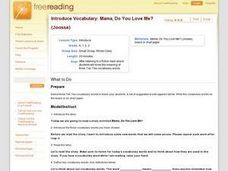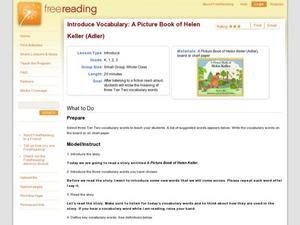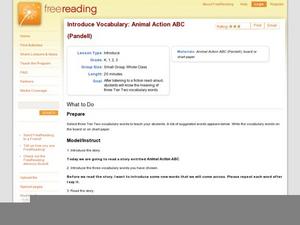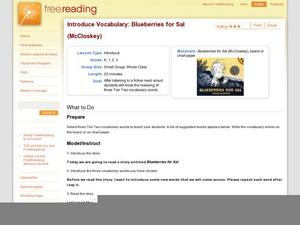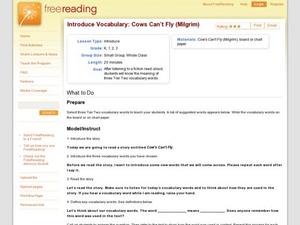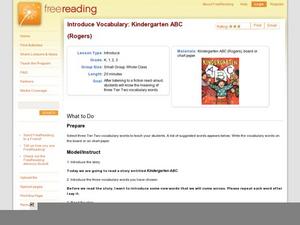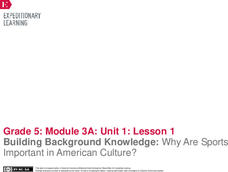Curated OER
Introduce Vocabulary: Franklin's New Friend
The story Franklin's New Friend contains three tier-two vocabulary words! Your class reads the story, identifies the vocabulary words, and then works to construct their meanings. The new words are recorded either in a journal entry...
Curated OER
Introduce Vocabulary: Mama, Do You Love Me?
Youngsters analyze tier two vocabulary words. Learners explore their comprehension of tier two vocabulary words found while reading Mama, Do You Love Me? and record their vocabulary using a word journal or discovery chart.
Curated OER
Introduce Vocabulary: A Picture Book of Helen Keller (Adler)
The story of Helen Keller is a fascinating one for young scholars; use it to practice reading comprehension and new vocabulary as learners listen to you read David Adler's picture book (hint: this strategy can be applied to any book)....
Curated OER
Introduce Vocabulary: Animal Action ABC (Pandell)
Get your kinesthetic learners engaged in a vocabulary study using Karen Pandell's book, Animal Action ABC. They move around as you read, and raise their hands whenever they hear one of the words you are learning. Pre-teach the...
Curated OER
Introduce Vocabulary: Are Trees Alive? (Miller)
Explore the life inside trees as scholars learn vocabulary through Debbie Miller's informational text Are Trees Alive? Familiarize pupils with the new words they will hear like anchor, disease, awaken,...
Curated OER
Introduce Vocabulary: Arthur's Baby (Brown)
Many of your youngsters have experienced a new baby coming home, and Marc Brown's story Arthur's Baby is a relatable way to cover some new vocabulary terms. Introduce and define the new words before reading the text aloud:...
Curated OER
Introduce Vocabulary: Blueberries for Sal (McCloskey)
Take your budding readers on a literary trip to pick blueberries as they learn vocabulary from Robert McClosky's book, Blueberries for Sal. By pre-teaching the words pupils are prepared to raise their hands when they hear...
Curated OER
Introduce Vocabulary: Clouds (Bauer)
What type of cloud is that? Explore meteorological vocabulary using Marion Bauer's book, Clouds (although these strategies could be used for any fiction or nonfiction text). Pre-teach the new words before reading the story...
Curated OER
Introduce Vocabulary: Cows Can't Fly (Milgrim)
Cows can't fly, can they? David Milgrim's whimsical story makes vocabulary fun! Although this strategy can be used with any text, using Cows Can't Fly will be a breeze with this outline. Pupils are ready to raise their...
Curated OER
Introduce Vocabulary: Cross a Bridge (Hunter)
What does suspension mean? Learn this and other bridge-related vocabulary as scholars listen to Ryan Ann Hunter's nonfiction book, Cross a Bridge. This strategy can be applied to any book. Before reading, acquaint pupils...
Curated OER
Introduce Vocabulary: Dandelion (Freeman)
Dandelion the lion is dapper and elegant; young readers learn these and more vocabulary words as they read Don Freeman's story Dandelion (hint: this strategy can be applied to any book). Familiarize pupils with the new words...
Curated OER
Introduce Vocabulary: Dinosaur Bones (Barner)
Dig into some prehistoric vocabulary in Bob Barner's informative book Dinosaur Bones. This works best if you introduce the primitive words before reading the story. These are the focus terms in the text: ancient, climate, extinct,...
Curated OER
Introduce Vocabulary: Gregory, the Terrible Eater (Sharmat)
Help budding readers learn words like develop and revolting as they listen to you read Mitchell Sharmant's Gregory, the Terrible Eater. Get the new vocabulary rolling before reading it aloud so youngsters can raise a...
Curated OER
Introduce Vocabulary: Kindergarten ABC (Rogers)
As kindergartners are learning the alphabet, expand their vocabulary in the process using Jacqueline Rogers' book Kindergarten ABC. Each page features a letter and various objects for scholars to locate in the picture, and...
Curated OER
Reading and Responding: Lesson 9
Follow this lesson plan, which is written more like a script, to practice reading a poem with your class. Pupils read "The Road Not Taken" and respond to five multiple choice questions on a provided worksheet. The plan leads you through...
Novelinks
The Color of Water: Word Square Instructions
Immaculate, accumulation, dissipation. Vocabulary drawn from chapter 16 of James McBride's memoir, The Color of Water, can prove to be challenge for readers. To help kids understand the meaning of these words and what they add to the...
EngageNY
Identifying Author’s Opinion and Evidence: The Value of Sports in People’s Lives, Part II
Context matters! Using the intuitive resource, pupils decipher context clues to determine the meaning of unknown words from an informational text. Also, in small groups, they practice identifying the author's opinion and supporting...
PBS
The Diary of Anne Frank
While designed to supplement a viewing of the PBS Masterpiece Classic The Diary of Anne Frank, this resource can also serve as an excellent informational text and activity source for your students on the historical context and timeline...
Scholastic
Frindle Lesson Plan
"Who says a pen has to be called a pen? Why not call it a frindle?" Inspired by this quote from the award-winning novel written by Andrew Celements, this lesson allows children to invent their own...
Curated OER
Mini-Lesson Planning for Inferences
Making inferences and drawing conclusions is a key component to successful active reading. Encourage your class to use context clues and prior knowledge to infer different elements of a story, including the setting, plot, and character...
Houghton Mifflin Harcourt
Around Town: Neighborhood and Community: English Language Development Lessons (Theme 3)
Here is a unit designed to support English language development. Scholars speak, move, and write to learn more about topics that focus on community and local concepts. The series of lessons aids to reinforce concepts...
EngageNY
Building Background Knowledge: The Dinka and Nuer Tribes Until the Mid-1980s (“Sudanese Tribes Confront Modern War” Excerpt 1) (Version 1)
Readers consider comparisons between the Dinka and Nuer tribes in South Sudan, making connections between an informational article about Sudanese tribes and the novel A Long Walk to Water by Linda Sue Park. They annotate the text to help...
EngageNY
Building Background Knowledge: The Dinka and Nuer Tribes
Building on a previous lesson plan, readers continue using context clues to learn new vocabulary. Additionally, they continue working on their Gathering Evidence graphic organizers, making connections between an informational text and A...
EngageNY
Building Background Knowledge: Why Are Sports Important in American Culture?
What makes sports so special to many Americans? Scholars ponder the question as they participate in a gallery walk, immersing themselves in images and texts about sports. Pupils also complete a vocabulary strategies anchor chart to...
Other popular searches
- Context Clues
- Context Clues Worksheets
- Context Clues Stories
- Word Meaning Context Clues
- Context Clue Worksheets
- Identifying Context Clues
- Context Clues First Grade
- Context Clues Worksheets 2nd
- Using Context Clues
- Context Clues Lessons
- Antonyms in Context Clues
- Word Meaning in Context

